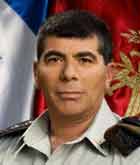Gabi Ashkenazi

(1954 - )
Gabi
Ashkenazi is an Israeli soldier and former Chief of Staff of the Israel Defense Forces.
Ashkenazi (born February 25, 1954) was born and grew up in Hagor, a moshav in central Israel. He began his military
service in the Golani
Infantry Brigade in 1972 and served
in the Sinai Peninsula during the 1973 Yom
Kippur War.
In
July 1976, he was a platoon leader in Operation
Entebbe to rescue kidnapped Israeli
hostages held in Uganda.
He first served in Lebanon in
1978, during Operation Litani. During the 1982
Lebanon War, Ashkenazi served as Deputy
Commander of the Golani
Brigade and was promoted to Commander
in 1986.
In
1988, Ashkenazi was appointed head of Intelligence
for the Northern Command. In the early
1990s, he commanded a reserve armor division
and then went on to serve as head of Israel's
Lebanon liaison unit. In 1994, he was promoted
to Chief of the General Staff's Operations
Division. In 1996, he was promoted to the
rank of Major General and to the position
of Aide to Chief of the Operations Branch.
In 1998 he was appointed GOC Northern Command,
a position in which he oversaw Israel's
withdrawal from the security zone in
southern Lebanon,
bringing to an end Israel's 18-year presence
there.
Appointed IDF Deputy
Chief of Staff in 2002, Ashkenazi was in
charge of the construction of the West
Bank security fence, erected to prevent
terrorist attacks within Israel. He resigned
from the IDF in May 2005 when Dan
Halutz was appointed IDF Chief
of Staff.
Gabi
Ashkenazi was appointed Director General
of the Ministry of Defense in July 2006.
In February 2007, he was promoted to the
rank of Lieutenant-General and appointed
19th Chief of
the General Staff of the Israeli Defense
Forces, a post he held until his retirement from the army in February 2011.
Ashkenazi
is a graduate of the Command and Staff
College of the IDF and the Command and
Staff College of the U.S. Marine Corps
in Quantico, Virginia. He also holds a
B.A. degree in Political Science from Tel
Aviv University and a degree in International Business
Administration from Harvard University.
He
is married and has two children.
Sources: Israeli
Foreign Ministry; Wikipedia |